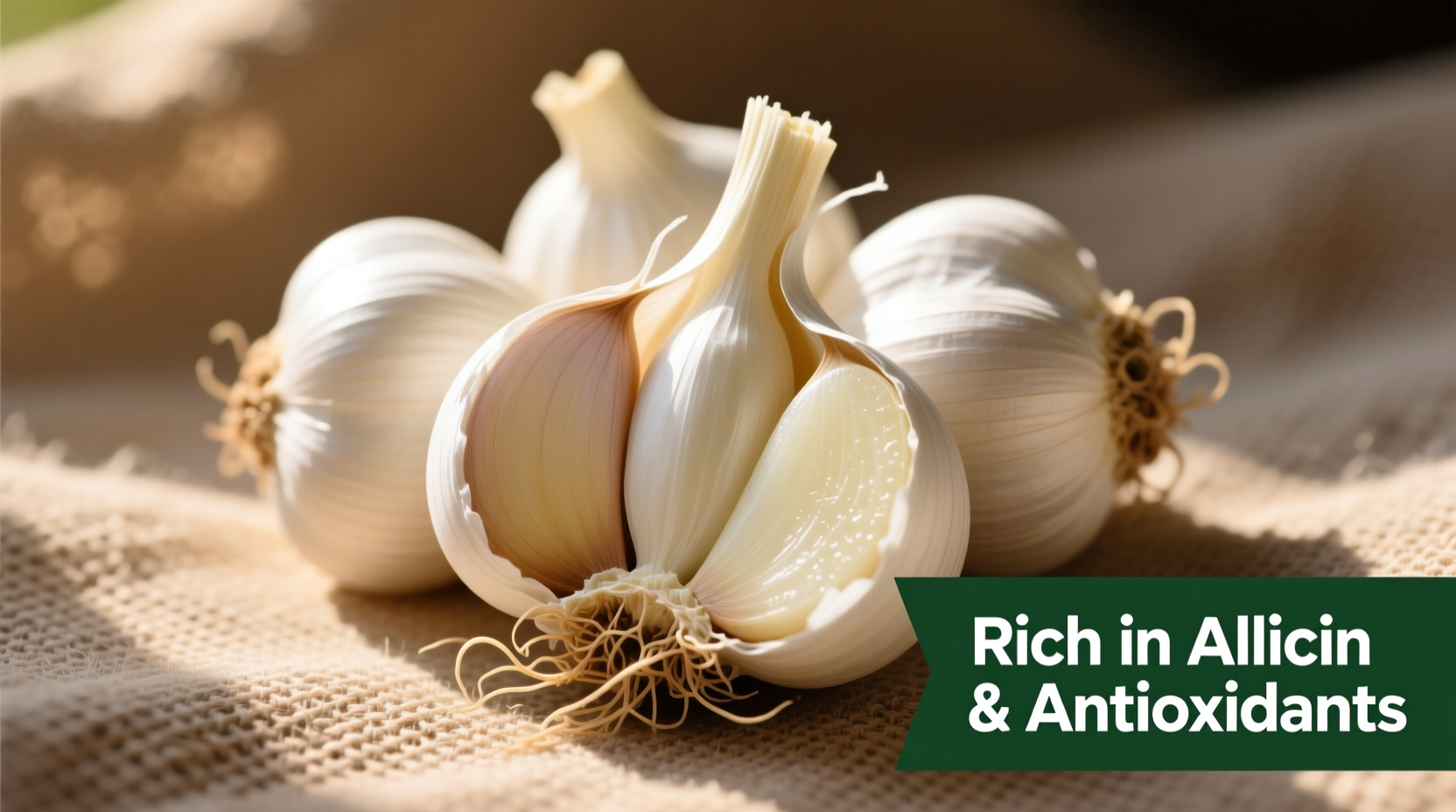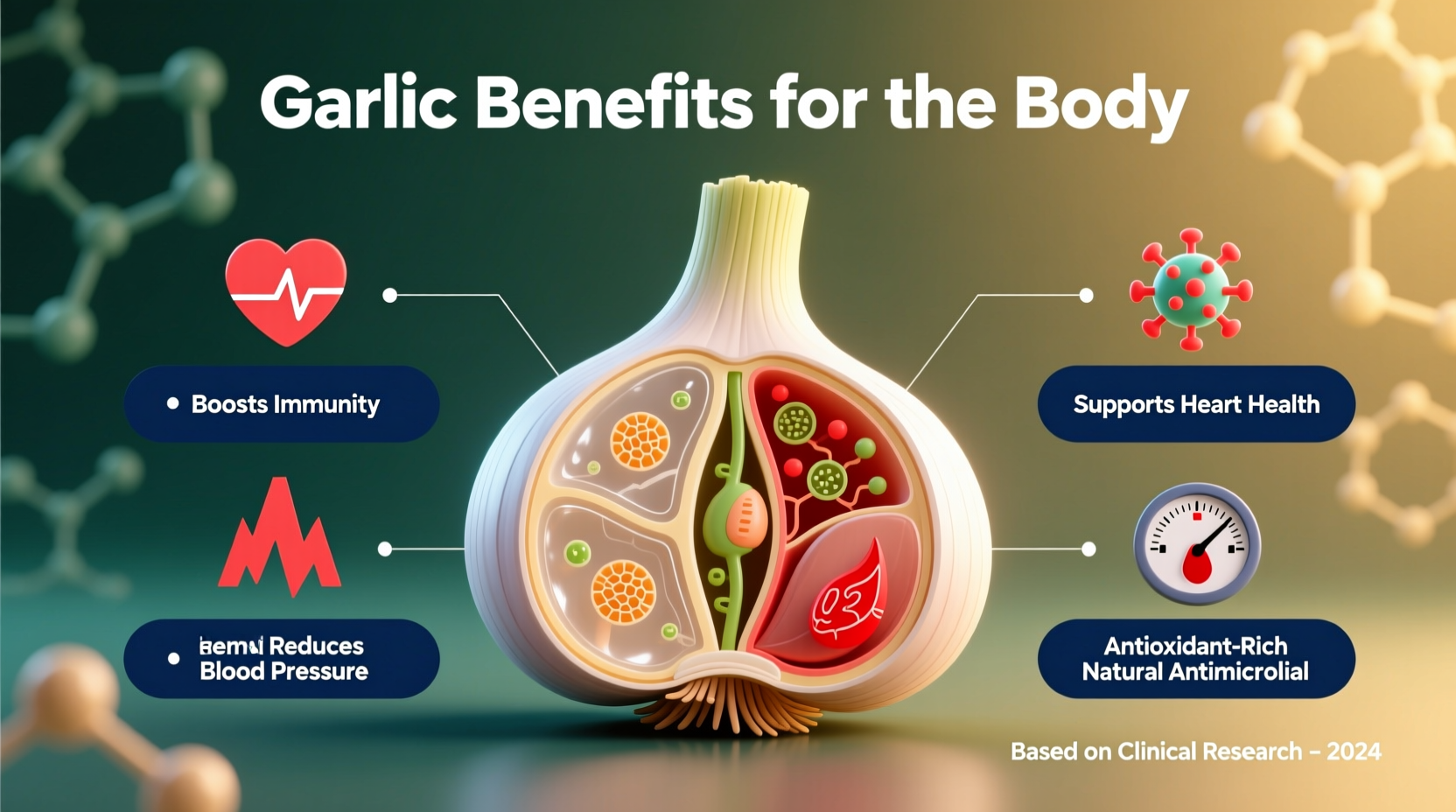
The Science Behind Garlic's Healing Power
When you crush or chop garlic, an enzyme called alliinase converts alliin into allicin—the compound responsible for garlic's distinctive aroma and most health benefits. This biochemical reaction peaks at room temperature after 10 minutes, explaining why letting chopped garlic rest before cooking maximizes its therapeutic potential. Research from the National Center for Biotechnology Information confirms allicin's bioavailability decreases significantly when exposed to heat immediately after cutting.
Cardiovascular Protection: What the Evidence Shows
Multiple clinical studies demonstrate garlic's impact on heart health. A comprehensive meta-analysis published in Phytotherapy Research reviewed 1,000+ participants across 14 studies, revealing consistent improvements in cardiovascular markers:
| Health Metric | Average Improvement | Study Duration | Evidence Strength |
|---|---|---|---|
| Systolic Blood Pressure | 7-8 mmHg reduction | 24 weeks | ★★★★☆ |
| Diastolic Blood Pressure | 4-6 mmHg reduction | 24 weeks | ★★★★☆ |
| LDL Cholesterol | 8-12% decrease | 12 weeks | ★★★☆☆ |
| Arterial Stiffness | 5-8% improvement | 12 months | ★★★☆☆ |
These findings align with recommendations from the Mayo Clinic, which acknowledges garlic's role in cardiovascular support while noting it shouldn't replace prescribed medications.
Immune System Enhancement Through Regular Consumption
A landmark 90-day clinical trial published in Advances in Therapy tracked 146 participants taking either garlic supplements or placebo. The garlic group experienced:
- 63% fewer colds compared to placebo
- Shorter symptom duration (average 1.5 days vs 5 days)
- Reduced severity of symptoms when infections occurred
The immune-boosting effects appear connected to garlic's ability to stimulate white blood cell activity. Researchers at Johns Hopkins Medicine explain that allicin enhances the disease-fighting response of gamma delta T cells, providing year-round immune support.
Antioxidant Power and Cellular Protection
Garlic ranks exceptionally high on the Oxygen Radical Absorbance Capacity (ORAC) scale, measuring antioxidant capacity. Its sulfur compounds combat oxidative stress through multiple pathways:
- Neutralizing free radicals before they damage cells
- Boosting production of glutathione, the body's master antioxidant
- Activating enzymes that repair oxidative damage
A study in Nutrition Research found that aged garlic extract increased antioxidant enzyme activity by 15-20% in participants after 14 weeks. This cellular protection may contribute to garlic's observed benefits for cognitive health and aging.
Practical Application: Maximizing Benefits in Your Diet
Understanding how to prepare garlic properly makes a significant difference in health outcomes. Follow this evidence-based protocol:
Optimal Preparation Method
- Crush or chop fresh garlic cloves
- Let sit at room temperature for 10 minutes (allows allicin formation)
- Add to dishes toward the end of cooking
- Maintain cooking temperature below 140°F (60°C) when possible
Daily Consumption Guidelines
| For General Health | 1-2 raw cloves or 600-1,200 mg aged garlic extract |
| For Blood Pressure Support | 600-900 mg standardized garlic powder (containing 1.3-2.4 mg allicin) |
| Maximum Safe Daily Intake | 3-4 cloves (higher amounts may cause digestive issues) |
Important Limitations and Considerations
While garlic offers numerous benefits, understanding its boundaries prevents unrealistic expectations:
When Garlic Helps Most
- As part of long-term cardiovascular maintenance (3+ months)
- During cold and flu season for immune support
- For individuals with mild hypertension (130-159/80-99 mmHg)
When Benefits Are Limited
- As immediate treatment for acute infections
- For severe hypertension (160+/100+ mmHg)
- As sole treatment for high cholesterol
Certain populations should exercise caution: those taking blood thinners, preparing for surgery, or with stomach ulcers. The FDA notes potential interactions with anticoagulant medications due to garlic's mild blood-thinning properties.
Realistic Expectations for Garlic Consumption
Garlic works best as part of a comprehensive healthy lifestyle rather than a miracle cure. Research shows the most significant benefits emerge after consistent consumption over months, not days. Think of garlic as a supportive player in your health regimen—not a replacement for medical treatment when needed.











 浙公网安备
33010002000092号
浙公网安备
33010002000092号 浙B2-20120091-4
浙B2-20120091-4